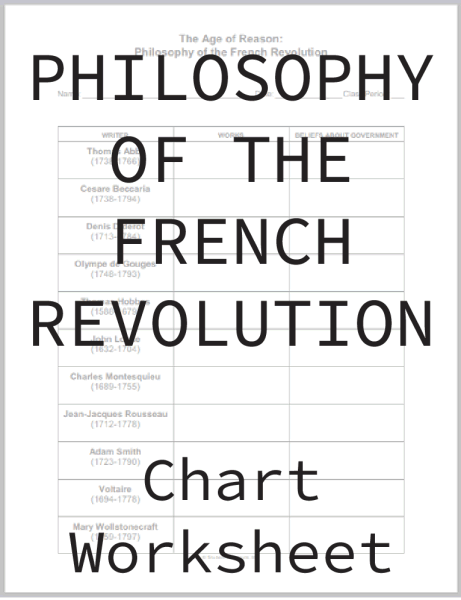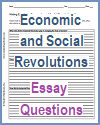The Age of Reason: Philosophy of the French Revolution |
|---|
| www.studenthandouts.com > World History > French Revolution > French Revolution Worksheets |
|---|
 |  |
|---|
| Students complete this chart, citing the works and political beliefs of Thomas Abbt, Cesare Beccaria, Denis Diderot, Olympe de Gouges, Thomas Hobbes, John Locke, Charles Montesquieu, Jean-Jacques Rousseau, Adam Smith, Voltaire, and Mary Wollstonecraft. Click here to print. Answers will vary. |
|---|
|
Here is a brief overview of the works and political beliefs of these philosophers and writers.
Thomas Abbt: Abbt was a German philosopher and author known for his essay Vom Tode fürs Vaterland (On the Death for the Fatherland). He emphasized the importance of patriotism and self-sacrifice for the common good. Cesare Beccaria: Beccaria was an Italian jurist and author of On Crimes and Punishments. He advocated for criminal justice reform, including the abolition of torture and the principle that punishment should be proportionate to the crime. Denis Diderot: Diderot was a French philosopher and the editor of the Encyclopédie, a groundbreaking encyclopedia that promoted Enlightenment ideas, including secularism and reason. Olympe de Gouges: De Gouges was a French feminist and playwright. She is best known for The Declaration of the Rights of Woman and of the Female Citizen, which advocated for women's rights during the French Revolution. Thomas Hobbes: Hobbes, an English philosopher, authored Leviathan. He believed in a social contract theory where individuals gave up some freedoms to a central authority (the Leviathan) in exchange for security and order. John Locke: Locke, another English philosopher, is known for his Two Treatises of Government. He argued for natural rights, including life, liberty, and property, and the idea of a government's legitimacy being based on the consent of the governed. Charles Montesquieu: Montesquieu, a French political philosopher, wrote The Spirit of the Laws. He introduced the concept of the separation of powers in government, advocating for a system of checks and balances. Jean-Jacques Rousseau: Rousseau, a French philosopher, authored The Social Contract. He discussed the general will and the idea that legitimate authority comes from the people themselves through a social contract. Adam Smith: Smith, a Scottish economist, is known for The Wealth of Nations. He is considered the father of modern economics and advocated for free-market capitalism and the "invisible hand" guiding economic self-interest. Voltaire: Voltaire was a French writer and philosopher. He championed freedom of speech and religious tolerance, often expressed in his famous statement, "I disapprove of what you say but will defend to the death your right to say it." Mary Wollstonecraft: Wollstonecraft was an English writer and advocate for women's rights. She authored A Vindication of the Rights of Woman, arguing for equal educational opportunities and rights for women. These thinkers played significant roles in the Enlightenment and the development of political, social, and economic thought, that fed the ideals of the French Revolution. Their works continue to influence discussions on individual rights, government, justice, and societal progress. |
| French Revolution Books and Films | French Revolution Outlines and PowerPoints |
| French Revolution Maps and Pictures | French Revolution Study Games |
| French Revolution Miscellany | French Revolution Worksheets |
| www.studenthandouts.com > World History > French Revolution > French Revolution Worksheets |
|---|









